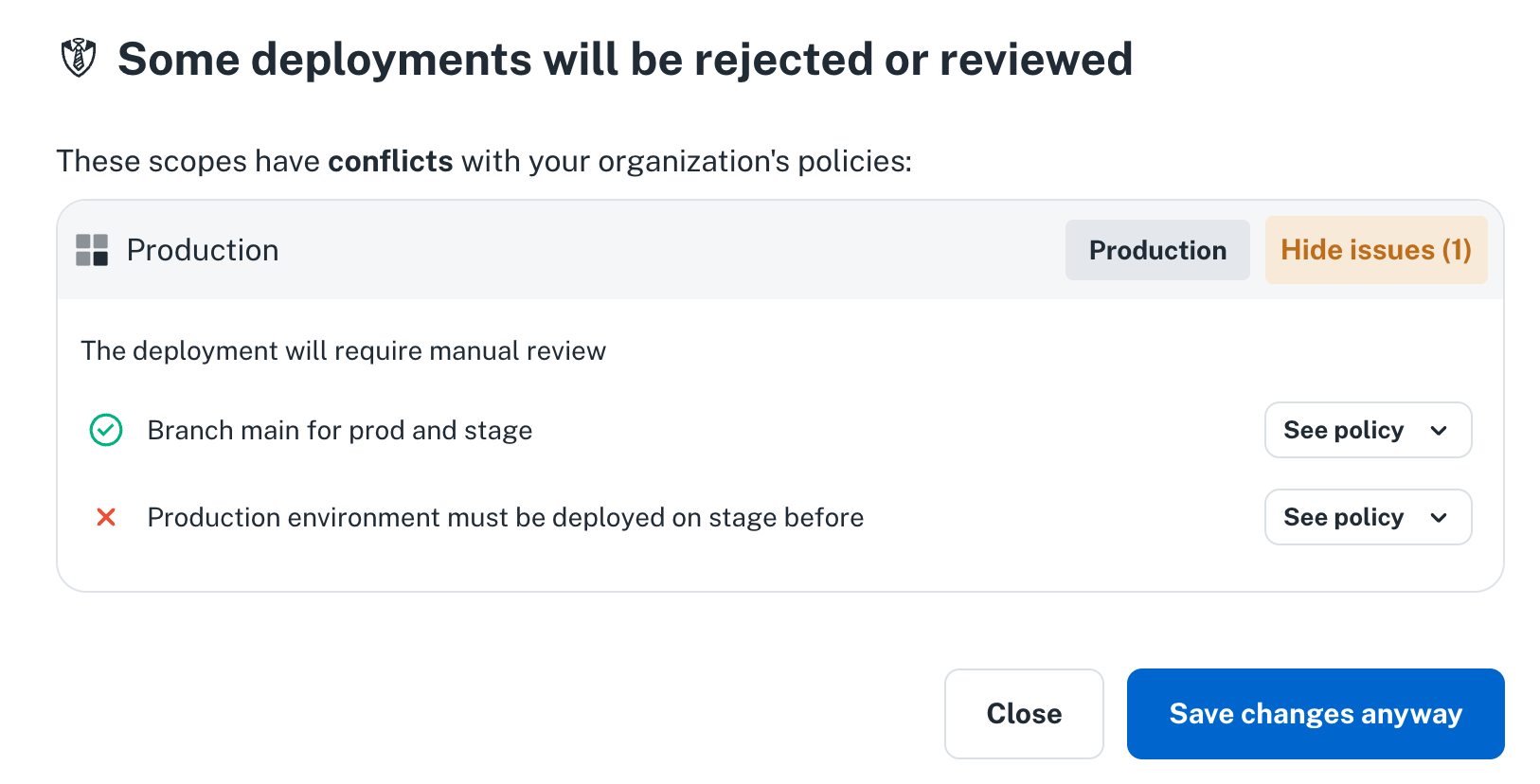Require stage deployment before production
🎯 Goal: Set up nullplatform so a build can only be deployed to production if it has already been deployed to stage.
Introduction
In many workflows, deployments to production should depend on conditions. A common rule is: only allow (or require approval for) a production deployment if the build has already gone through stage.
In this guide, you’ll implement that rule in nullplatform using:
- Metadata to track deployed environments
- Hooks to update metadata automatically
- Policies to enforce the restriction
We’ll assume you’re using the environment dimension with the values: development, stage, and production.
What you’ll set up
By the end of this guide, you’ll have:
- Builds that track which environments they’ve been deployed to
- Deployments that automatically update that metadata
- A policy that blocks production deployments unless the build has already gone through stage


1. Create metadata for builds
Metadata in nullplatform lets you extend entities with your own organization-specific behavior.
Here, we’ll add a metadata type to the build entity that records the environments where it has been successfully deployed.
Run this to create the metadata specification:
curl -L 'https://api.nullplatform.com/metadata/metadata_specification' \
-H 'Content-Type: application/json' \
-H 'Authorization: Bearer <token>' \
-d '{
"entity": "build",
"metadata": "deployed_on",
"nrn": "<nrn of your account or where you want to apply it>",
"description": "Tag to track where the build was deployed",
"name": "Build deployed environments",
"schema": {
"type": "object",
"properties": {
"environments": {
"title": "Deployed Environments",
"visibleOn": ["read", "list"],
"type": "array",
"items": {
"type": "string",
"enum": ["development", "stage", "production"]
},
"default": [],
"uniqueItems": true
}
},
"additionalProperties": false
}
}'
Once set up, builds can hold metadata like this:
{
"id": 123,
"application_id": 456,
"status": "successful",
"branch": "dev",
"metadata": {
"deployed_on": {
"environments": ["development", "stage"]
}
}
}
2. Automatically update metadata with a deployment hook
Now that we have the metadata spec, we want deployments to update it automatically.
For that, we’ll create a hook on the deployment entity.
Hooks in nullplatform let you respond to entity changes with custom logic. In this case, the hook will run after a deployment finishes to update the build metadata.
Create the hook
Run this command to create the hook:
np entity-hook action create \
--body '{
"nrn": "<nrn>",
"entity": "deployment",
"action": "deployment:write",
"when": "after",
"type": "hook",
"on": "update"
}'
Note: Replace the
nrnwith NRN of your account or where you want to apply it.
Create the notification channel
Next, create a channel so the hook notifies your agent.
To create a channel, you’ll need an API key that:
- Is set at the
accountlevel - Has the
agentandopsroles assigned
See Manage your API keys for details.
np notification channel create
--body '{
"nrn": "<nrn>",
"type": "agent",
"configuration": {
"api_key": "<apikey>",
"command": {
"data": {
"cmdline": "<base-path>/handle-entity-hooks.sh",
"environment": {
"NP_ACTION_CONTEXT": "${NOTIFICATION_CONTEXT}"
}
},
"type": "exec"
}
},
"source": ["entity"],
"status": "active"
}'
Create the handler script
Finally, in your agent repository (see Agent docs for reference), create a new file at:
<base-path>/handle-entity-hooks.sh
#!/bin/bash
WORKING_DIRECTORY="$(dirname "$(realpath "$0")")"
cd "$WORKING_DIRECTORY" || exit 1
echo "Received $NP_ACTION_CONTEXT"
eval "$(np service-action export-action-data --format bash --bash-prefix HOOK)"
if [[ $HOOK_ENTITY == "deployment" ]]; then
export DEPLOYMENT_ID=$(echo "$HOOK_NRN" | sed 's/.*deployment=\([0-9]*\).*/\1/')
eval "$(np deployment read --id $DEPLOYMENT_ID --format bash --bash-prefix DEPLOYMENT --api-key $NP_API_KEY)"
if [[ "$DEPLOYMENT_STATUS" == "finalized" ]]; then
eval "$(np scope read --id $DEPLOYMENT_SCOPE_ID --format bash --bash-prefix SCOPE)"
eval "$(np release read --id $DEPLOYMENT_RELEASE_ID --format bash --bash-prefix RELEASE)"
eval "$(np build read --id $RELEASE_BUILD_ID --format bash --bash-prefix BUILD)"
if [[ "$BUILD_METADATA_DEPLOYED_ON_ENVIRONMENTS_LENGTH" != "" ]]; then
np metadata update --entity build --id $RELEASE_BUILD_ID --data "{\"deployed_on\":{\"environments\":[\"$SCOPE_DIMENSIONS_ENVIRONMENT\"]}}"
else
np metadata create --entity build --id $RELEASE_BUILD_ID --data "{\"deployed_on\":{\"environments\":[\"$SCOPE_DIMENSIONS_ENVIRONMENT\"]}}"
fi
fi
fi
3. Create a policy to block production without stage
At this point, builds track their deployed environments automatically. The last step is to add a policy that prevents deploying to production unless the build has already been through stage.
First, create an approval action:
np approval action create
--body '{
"nrn": "<nrn>",
"entity": "deployment",
"action": "deployment:create",
"dimensions": { "environment": "production" },
"status": "active",
"on_policy_success": "approve",
"on_policy_fail": "manual"
}'
Then, define the policy:
np approval policy create
--body '{
"nrn": "<nrn>",
"name": "Production requires Stage deployment first",
"status": "active",
"conditions": {
"build.metadata.deployed_on.environments": { "$in": ["stage"] }
},
"selector": {
"scope.dimensions.environment": "production"
}
}'
Finally, link the policy to the approval action:
np approval action policy associate
--id :id
--body '{
"policy_id": 0
}'
Wrap-up 🎉
You now have a setup where:
- Builds automatically record which environments they’ve been deployed to
- Deployments to production are blocked (or require approval) until the build has been deployed to stage
This pattern enforces safer, progressive promotion of builds while demonstrating how metadata, hooks, and policies in nullplatform can be combined to shape deployment workflows.
Related docs
Quick links to resources used in this guide: